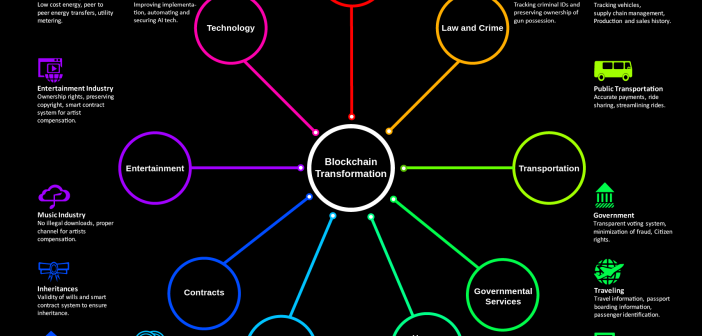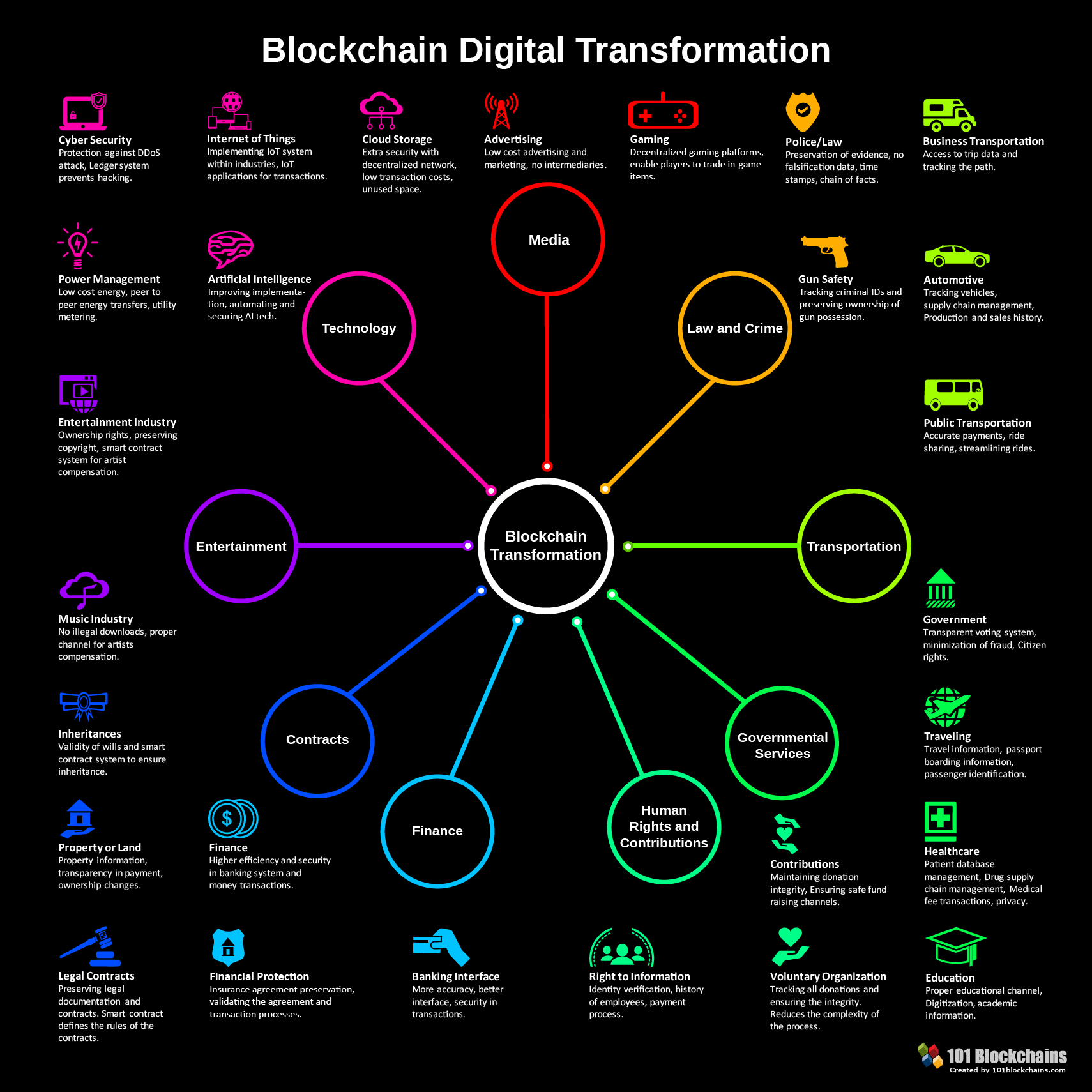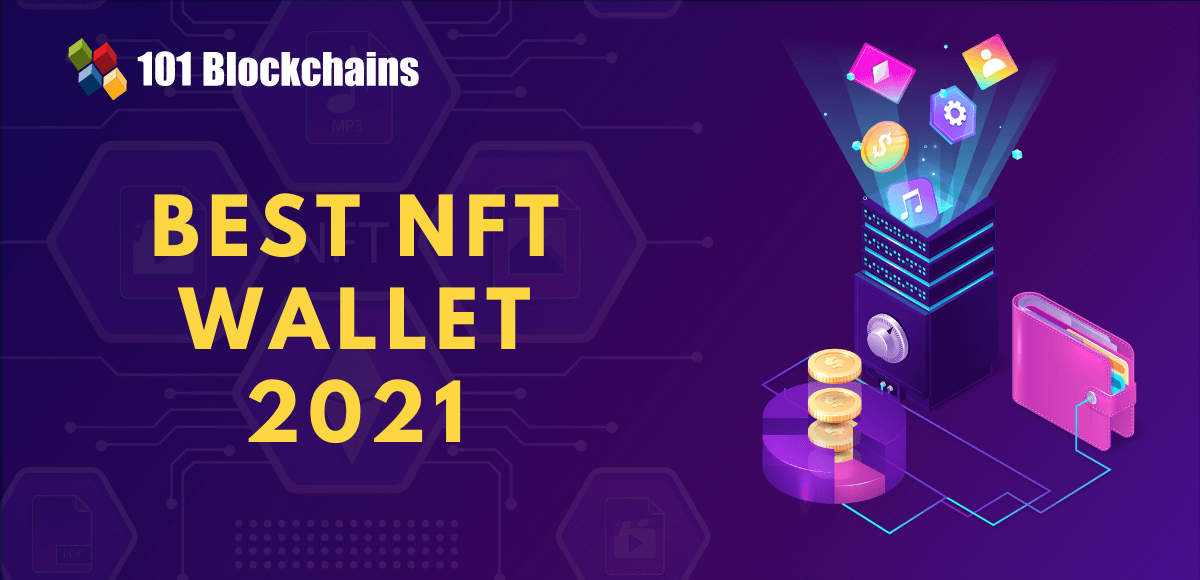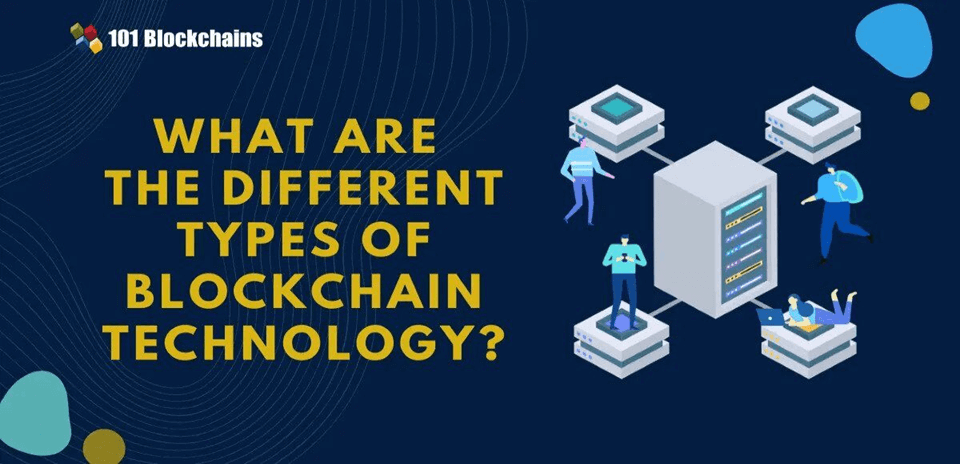Learn how blockchain truly works, master key definitions, and uncover what makes smart contracts so "smart." Dive into the fundamentals, gain valuable insights, and start your blockchain journey today!

- Reviews
101 Blockchains
- on September 02, 2018
Blockchain Digital Transformation- 30+ Blockchain Transformation Examples
Blockchain transformation is upon us. It all started with Bitcoin. It first appeared in 2009, and from there the growth has not stopped at all. We can say that we are currently at a stage where Organizations and Enterprises start adopting it. Its impact is undeniable, and industries are following the trend.
Blockchain digital transformation idea is simple enough to digest. It allows distributed nodes to connect with each other without the need for a centralized authority. Digital ledger is what makes it possible where security, immutability, and transparency are the top three benefits.
However, that’s not what we are going to discuss today. In today’s article, we will be focusing heavily on the industries that are currently transformed from blockchain.
With Bitcoin, the first generation of blockchain technology came into existence. It was promising, but just like any first-generation technology, it also had issues associated with it.
Just like how the internet came into existence and had issues with it.
The first generation of the internet was bland and simple. It worked as it should, but you can only find static websites there. We can always think about the internet as the first digital transformation that changed lives. However, it grew, and now we have are at Web 2.0. The blockchain is a technology that can be termed as a second digital transformation and will completely change our digital lives. With blockchain, we are building the Web 3.0, the future of the internet and it is the blockchain transformation we are waiting for.
Build your identity as a certified blockchain expert with 101 Blockchains’ Blockchain Certifications designed to provide enhanced career prospects.
Blockchain Transformation
The blockchain is ubiquitous and can be used to solve diverse problems. For example, it is useful in banking as it makes cross-border payments faster and more secure. Whereas in Finance, it can help companies to have a more secure and faster transaction with complete transparency.
Data store can also be a great use-case for blockchain as we can distribute data among nodes where it doesn’t need to be with a centralized authority. There are more blockchain business transformation examples which we are going to discuss below.
In short, we are witnessing the new change as it is going to transform the customer experience.
Many startups are already taking the challenge and are developing novel solutions based on the blockchain. It will digitalize the ecosystem better and ensure that we have a working infrastructure in the major industry that is directly connected to our daily lives. In this article, we will be discussing how an industry is transformed. We will also add some examples along with it.
To achieve a blockchain transformation we need to counter the threats that stop its growth. Automation is the key for the second digital transformation. Not only that, but we also have to solve security issues and ensure that technology grows without being hampered.
Blockchain will also transform the internet by providing a highly scalable solution based on different blockchain models.
Before we get started, let’s try to understand more about the blockchain its impact on the world around us.
Get familiar with the terms related to blockchain with Blockchain Basics Flashcards.
How we solved problems before blockchain?
Blockchain is a comparatively new technology. It is only one decade old, and we have to go a long way before we can do anything substantial with it. To truly understand its capabilities we need to know how our world worked before the blockchain digital transformation started.
Before blockchain was introduced, our world was efficient but was not taking advantage of the decentralized network. At that time, having a central authority was necessary to run operations smoothly. Without them, it is not possible.
Automation was also limited and couldn’t flourish as there was always a need for a central authority to fulfill demands of a network. Before blockchain, we always had to use banks to do transactions or trade as well.
The economic landscape was all controlled by a central authority, and there was no other way to do transactions without the banks learning about it.
How is it changing now?
The first change in the blockchain transformation that you will instantly see is the absence of centralized authority. It changes how we interact with each other. Enterprises and organizations will also be going to take advantage of it by optimizing their network and automating it without the need for human interference. Almost every industry is going to get changed with the help of blockchain including banking.
Blockchain Digital Transformation Infographic
9 Verticals of Blockchain Transformation
1. Technology
Blockchain has completely transformed how the technology works in different sectors. To understand it better, we have decided to sub-categorize them as below.
-
Cloud Storage
Until now, cloud storage worked in a centralized environment. It was effective, but it is also vulnerable to security threats and hackers. With blockchain, consumers can trust the cloud storage more as it will move to a decentralized system where it is less likely to get exploited and will protect the data from being lost.
Storj is the prime example when it comes to decentralized cloud storage. It is changing the future of cloud storage by using blockchain and enabling users to have control over their data. It is currently in development and will be released in alpha stage soon. The idea is to utilize the utilized bandwidth around the globe and create a data center where performance, reliability, and transparency are the main factors for growth.
Blockchain-based storage is always better than traditional storage as it solves many challenges associated with traditional cloud storage system. Other projects worth mentioning include Siacoin, Filecoin, and MaidSafe. Cloud storage is a great example of blockchain transformation.
-
Internet of Things
Internet of Things(IoT) is a ground-breaking technology. With distributed ledger technology, it will completely change as it will bring more security, transparency, and opportunities that are never explored before. The key role of blockchain here is to ensure that the devices communicate with each other without any issues. Blockchain will also be able to store more information about the devices, how they interact and build a network of trust among the devices.
In short, blockchain will act as a basis of the interactions and transactions that takes place in the network. Smart contracts will also make it easy for the engineers to automate the whole network. The key benefits of using blockchain in IoT includes trust building, low cost implementation, and faster transactions.
Many IoT blockchain applications caught our attention. However, the one that we want to discuss is IBM spotlighted blockchains which are currently unlocking how business can utilize IoT with the use of blockchain. Another example includes Hyundai Digital Asset Currency(HDAC), an IoT blockchain network which is currently building the IoT private blockchain. Filament startup is also working hard towards evolving the IoT industry by producing a chip which will take advantage of blockchain technology.
Want to familiarize yourself with the technology stack associated with IoT? Enroll Now in Internet Of Things (IoT) – Intermediate Level Course!
-
Power/Energy management
Energy management is necessary for a better future. We are living in a world where we need the power to do almost everything. We are also running low on methods to fulfill the energy requirement of the future. This is where blockchain transformation comes in.
Blockchain will change how we store, distribute and produce energy in the first place. Currently, there are many intermediates when it comes to energy supply. These companies take a huge chunk of the profit to ensure to deliver their service. With them gone, energy will become cheaper. To bring the ideas to life, many startups are working in the energy management sector. Energy blockchain startups raised almost $324 million funds in the last year. Until now, there are more than 100 energy startups that are participating in the blockchain transformation.
Our pick includes Conjoule and Drift. Conjoule is building a peer-to-peer network where each there will be PV owners, corporate buyers and public-sector. Drift, on the other hand, will be leveraging the DLT, trading and machine learning to offer a new retail energy provider.
-
Cyber Security
Cyber Security is a critical aspect of the current technology. Companies spend a lot of resources to protect their confidential data. They also want to protect their infrastructure from being exploited including routers, and other important devices. Not only that other critical infrastructure such as transportation, power plants, etc. also need protection against hack
Blockchains will completely change how cybersecurity is implemented in the first place. Firstly, it will change how the organization keep data decentralized. This way, they can deny hackers one place to hack. It will also introduce a peer-to-peer network which further improves the security of the network. Data theft and fraud will be the thing of the past, thanks to the protection that blockchain offers. It will also prevent Distributed Denial of Service(DDoS). Blockchain transformation can only help if we have a secure environment.
The startups or companies that caught our attention in the field of cybersecurity include Civic, Cambridge Blockchain, Gladius, Ledger and much more. We would like to mention what Gladius is doing. They are the startup that is currently using blockchain technology to fight DDoS attacks and decrease load times. This will help the business protect their online services from getting hampered.
Want to know how blockchain can enhance the cybersecurity landscape? Read here for How Blockchain Can Help Fight Cybercrime now!
2. Media
Media is a multi-dollar industry that is evolving with every year. However, it is currently not consumer or creator friendly due to intermediates taking advantage and making tons of revenue in the process. With blockchain, the whole land space can change and become more accessible to the consumers as well as the content creators. We think that it will impact the following two big sub-industries.
-
Advertising
Advertising is the core business model for many big companies. For example, Google and Facebook utilize the model to gain revenue while providing most of their services free of cost. The internet is a place where advertisers can place their ads and earn revenue in millions of dollars. That’s not all as mobile ecosystem also facilitates the advertising into apps.
So, how can blockchain transformation change advertising? It can be seen from two perspectives. The first perspective is how users will be affected. With new blockchain-powered grade browsers, it is now possible for consumers to turn off the advertising and protect their privacy at the same time.
The 2nd way of looking at it is removing the middleman. Brave will also release their token known as Basic Attention Token(BAT) that will change how users and advertisers can directly interact with each other, removing intermediaries such as Facebook, Google, etc. This way, both advertisers, and consumers get benefited with the help of the blockchain.
Another notable blockchain startup that we would like to mention is AdEx. It is a decentralized ad network which serves ads with the use of smart contracts and blockchain.
-
Market Evaluation/Forecasting
Forecasting is the future. As things are evolving in complexity over time, it is not possible for humans to understand the underlying complexity and make decisions. With forecasting or market evaluation tools, it will become easy for marketers and managers to make a better decision.
Blockchain transformation can speed up the forecasting to an entirely new level. The holistic approach can have its impact on analysis, research and other market sectors as well. As blockchain can hold a massive amount of data, it can be used in conjunction with machine learning or artificial intelligence.
Augur, for example, is doing just that. They are using Ethereum blockchain to power their prediction protocol that is operated and owned by the people rather than any centralized organization. It rewards people if they predict it correctly. Right now, they are in beta and are slowly moving to their main release. Another awesome example would be Gnosis. They are redistributing the future by providing a prediction market platform where resources are distributed accordingly.
-
Gaming
You would be surprised to know that Gaming is influenced by blockchain transformation. Gaming until now is controlled by corporations as they release games that cost millions of dollars to create. Also, in-game items economy is also controlled by the game company. Now this will all change thanks to decentralized gaming platforms. It will also help independent game developers to release their games to the world without worrying about permission or fees related issues. Esports will also flourish due to the blockchain.
Decentralized gaming has also caught attention from the players and as well as companies who are in this sphere.
Bountie is a Singaporean esports that is solving eSports problem with the help of cryptocurrency and blockchain. They are simplifying the transaction issues and making it transparent and fast. Another example would be Dreamteam that is solving internal eSport problems by solving organization, payment and sponsor issues.
3. Law and Crime
Our society always needs a solution for the crimes that take place. Law enforces those strict guidelines and ensures that crime is maintained at an all-time low. You will be surprised to see that the law is also affected by blockchain transformation. We have decided to categorize it into the following.
-
Police/law
The blockchain maintains the integrity of the data and hence provides a great place to store all the evidence. It can also be distributed without worrying about tempering and adds the necessary layer of security which adds meaning and trust to law enforcement.
We are fascinated by two startups that are doing the heavy lifting in this sector. They are Chronicled and Elliptic. Chronicled is focused on provides a smart supply chain solution. It is also developing near-field communications chips and tamper-proof containers where content can be registered and stored which is ideal for law enforcement agencies and authorities. Elliptic, on the other hand, is all about preventing crime in cryptocurrency by understanding patterns within the network and altering authorities in case something suspicious comes up.
We would also want to mention Neutrino. It offers a law enforcement solution which provides better tracking and analyzing tools across multiple blockchains.
-
Gun Tracking
Illegal ownership and use of guns are on the rise in many states across the world. With blockchain, we can have a system where each gun can be accounted for. The infrastructure will track each weapon that leaves the factory and helps stop illegal gun usage and export. The information once stored can also be retraced whenever needed. This means that if a gun is used in a crime, it can be traced back to its original owner or its origins can be known instantly.
Blocksafe is a startup that is actually building a weapon tracking solution that will bring accountability into the system.
4. Transportation
Transportation is a vital part of our daily lives. It is also a major aspect of current business as they need to manage their supply chain and also ensure that they do it efficiently. Right now, the transportation industry is currently changed by blockchain transformation. It is doing it by lowering processing and administrative costs, lower disputes, improving overall transportation speed, and much more! To get a better glimpse, we are going to distribute it in the following categories.
-
Business Transportation
The blockchain is making business transportation more secure, cost-saving and helping logistic companies be top of their game. It does it by allowing easy data coordination using DLT. They can also utilize smart contracts to automate most of their transportation pipeline or create a custom solution to enable transportation for fragile and sensitive products easily. They are also enjoying the security that authenticity that blockchain has to offer. Not to mention, the whole network can scale to include more transportation vehicles, products, and information.
One such example that we would like to share is SkyCell which is currently building a refrigerated container that is blockchain-powered and ensures that the temperature remains stable during the transportation process.
BiTA(Blockchain in transport alliance) is working towards creating a standard for organizations to follow so that they can take proper advantage of blockchain and work with other organizations in a much better way.
-
Automotive
The automotive industry is growing rapidly in the past decade or so. With self-driving cars already out and shipping, it is now high time for the automotive industry to make use of the blockchain. The revolution has already started as IOTA showed their proof-of-concept with Volkswagen and showed how their IOTA tangle system could work for the autonomous cars.
Other players in the automotive market such as BMW are also building their solution which will improve their overall pipeline. Even Porsche has their blockchain apps.
-
Public Transport
The last aspect of transportation that we want to discuss is public transport. Public transportation always demanded improvement by the general public and government is also working towards improving it over time. With blockchain transformation, things will change drastically. Malta’s transport minister has already taken things in his hand by partnering with Omnitude, a startup that will use blockchain as a middleware.
Start your blockchain journey Now with the Enterprise Blockchains Fundamentals
5. Governmental Services
The government doesn’t like Bitcoin, but they love blockchain. The idea behind Bitcoin is to provide anyone the ability to do transactions without any interference either from the government or the banks itself. But, the blockchain is the technology that has caught the government’s attention as it can change how they can govern. Right now, governments are improving different aspects of their governance and also improving how they provide services to the average population. They cannot just ignore blockchain transformation. To better understand their effort, we are going to list their impact on different categories below.
-
Governance
The number one aim for government is to get their governance right. It includes having a proper transparent voting system, providing citizen right and minimize frauds in the system. Governance also includes decision-making process and ensuring that law and order are maintained at any cost. With blockchain, governments are exploring more automation through smart contracts and bringing the much-needed change in network, project or fund governance.
IBM has already been working on a blockchain transformation for governments. You can check it here: https://www.ibm.com/blogs/blockchain/category/blockchain-for-government/ They are providing a solution such as cross-border transactions, data sharing and so on. Another example that we would like to share is Georgian government working with BitFury Group to help them improve tracking and security of their government records. Read more in our previous article: “Blockchain Government Transformation: What it means? And how it will improve our life?”
-
Traveling
The travel industry is booming almost every year. For the government, it means that they need to revamp their systems so that they can make better passenger identification, store better travel information and make the passport boarding information more automated. Government’s are already deploying their way to make traveling more automated. Identification, for example, will be automated, all thanks to digital identity created for individuals to the blockchain. It will make it easy to clear customs, board a plan and do other travel tasks.
Passenger’s data can also be stored in the blockchain, making them easier to track and manage.
-
Healthcare
For governments, providing a healthcare that is sustainable, scalable and secure is more important. They are doing it all, thanks to the blockchain transformation. Hospitals or professionals can communicate with each other better and also provide effective treatment. The government can also keep records of the patients and bring healthcare services to the needy. Also, all the data stay secure.
Few notable healthcare blockchain players include Gem, Doc.AI, and Nebula Genomics. Gem is providing their own Gem Health Network which will make it easy for healthcare professionals to store, secure and share health-care-related data. Read more in our previous article “5 Use cases of Blockchain Technology in Healthcare industry“.
-
Education
Education is also been transformed by blockchain. Not only government organization, but private organizations are also seeking blockchain education apps. The first step is to make academic credentials verifiable through blockchain. This will give security, transparency, and freedom to check and retrieve credentials the way they want. It will also remove the documentation.
Many startups are currently working towards blockchain digital transformation in the education sector. For example, Odem is creating an On-Demand Education Marketplace which facilitates direct interaction between students and professionals and removes intermediaries entirely from the system.
The government can use the same application and educate the needy in distant places whenever needed. Another example is Edgecoin which is building the first e-learning token using the Ethereum blockchain. It will bring blockchain as a service to the education sector.
Curious to learn about blockchain implementation and strategy for managing your blockchain projects? Enroll Now in Blockchain Technology – Implementation And Strategy Course!
6. Human Rights And Contributions
Even though we are advancing at a breathtaking pace, we still need basic human rights. We as humans also need to contribute to our society in one way or another. In both the cases, we need blockchain to help improve the whole landscape. Blockchain digital transformation is currently taking over it as well. To properly understand it, we have sub-categorized it into following:
-
Contributions
There is a blockchain transformation in the contributions sector. It enables donations to be transparency and encourage more people to donate. Also, donations can be tracked to the very end making it easy for donations to know where their money went. Alice is one of the other blockchain platforms that brings transparency in the social funding. It builds trust and also ensures that no money is wasted. Giventh, another dApp built on Ethereum is an open-source platform which is powering charity.
-
Voluntary Organization
The voluntary organization is very similar to contributions which can be used to track all the donations ensuring there is trust in the system. Integrity is also maintained ensuring that no data is changed after the donation is made. The voluntary organization will also reduce the complexity of the whole donation process.
-
Right to Information
Right to information is the basic human right. Right now, anyone wants to know anything have to go through a complex process of filling forms and then waiting for days to get a reply. Different countries work differently which makes it even harder to exercise your right to information. Information such as employees history, identity verification, payment process, and others all fall under the power to information sub-category. Blockchain transformation can facilitate a proper process by providing proper data management and access to information.
7. Fintech
Fintech is the place where new ideas breed. With blockchain, Fintech will also change and see a paradigm shift. Right now, tons of Fintech startups are working with blockchain and aiming to provide a better solution. The involvement of blockchain in Fintech can be understood by the fact that out of the Forbes top 50 Fintech 2018, 11 are working in blockchain space.
To better understand, we have sub-categorized it below.
We will not discuss each sub-category individually as they are closely related. However, we are going to list a few of the amazing startups that are working in the blockchain Fintech sector.
Ubiquicoin ecosystem is our first pick. It is a unique system which offers predictions for the investors in the volatile blockchain environment. It uses a two-coin system which ensures that the risk can be eliminated as much as possible. It also uses a new consensus mechanism know as Proof of Majority.
Lendoit is a lending platform which offers a decentralized peer-to-peer lending platform. And, finally, the Kyber Network which provides a trustless, decentralized platform of liquidating crypto-assets.
8. Contracts
Contracts are needed to set up requirements for taking out a job, for payment and any other tasks that require two parties. It can be music, legal or even land or property. To simplify it, we have divided it into the following sub-categories. Read more about Smart Contracts.
-
Inheritances
Smart contacts can also empower inheritance and help blockchain transformation. It is best known as the digital inheritance which means to transfer your digital assets to someone else when you die. And, you would be surprised to find out that there are already crypto-inheritance services out there. Digipulse a Latvian startup is doing just that by providing the owner for setting up inheritance in situations where his digital assets will be transferred to someone else.
-
Legal Contracts
Legal industry will be changed with the help of blockchain and smart contracts. It will give rise to legal contracts that take advantage of the smart contracts and live on the blockchain. This way, intellectual property can be maintained by the owner without worrying about it being stolen. The legal contracts have to adhere to the blockchain law and hence cannot be coded outside the law.
-
Property and Land
The legal contracts can also influence property and land. Right now, it is all about having the right paper works. Sooner or later, everything will be digitized, and blockchain will provide a suitable means to register deeds, property ownership and so on. This will remove any scams or change of deed without the notice of the owner itself. Also, the information can be backtraced with full transparency and security.
Many startups are working towards the idea of digitizing the whole real-estate horizon. We liked Harbor, ShelterZoom, and Ubitquity as they all provide a unique way to solve the problem at hand.
Curious to understand the complete smart contract development lifecycle? Enroll in Smart Contracts Development Course Now!
9. Entertainment
Our last category for blockchain digital transformation is entertainment. Blockchain transformation is also changing entertainment. To make it more clear, we decided to divide it into two sub-categories:
-
Entertainment Industry
The future of entertainment will be in the hands of the blockchain. Blockchain will change the way how content is created or consumed. Right now, the entertainment industry is currently controlled by centralized entities including Twitch and Spotify or even Apple Music.
Twitch, for example, is biased towards popular streamers and it is tough for new streamers to get started on the platform. Apple Music and Spotify also seem to cut hefty fees and only give marginal benefits to the content creators.
Aventus is one of those open-source projects that aim to solve ticket problems. It will solve the problems of highly priced tickets and also eliminate fake tickets from the equation. Other key players that can transform the future of entertainment include MovieCoin, FlimChain Big Couch, StreamSpace, and others.
-
Music Industry
Music Industry is one of the most significant industry in the world. Blockchain can change entertainment. It will make sharing content more accessible and also use smart contracts to do. The smart contracts will ensure that the revenue is distributed to the parties according to the agreement. This simple pivotal change will make it easy for content creators to make the most out of their work. It will also remove intermediaries.
Few notable players include Opus. It is an open-source project which is using peer-to-peer IPFS technology on top of the Ethereum network. It will basically give the revenue directly to the content creators and artists by removing the intermediaries. Voise is also a decentralized music platform which takes advantage of the Ethereum network. Another notable startup is UjoMusic, which will make it easy for creators to have proper rights to their work, automating royalty using smart contracts.
Conclusion
The blockchain digital transformation has only started. We are witnessing changes in almost every sector that we can think off — it can be education, health, real-estate, and much more! Until now, we have covered a total of nine categories. We also sub-divided them to give a better glimpse of the blockchain transformation.
So, what does the future holds? It’s bright for sure. With enterprise and startups working in parallel to introduce new solution and improved already existing ones, it is now the best time to follow the whole revolution in front of your eyes. We think that it will take any time between 5-8 years for blockchain to become more ubiquitous.
*Disclaimer: The article should not be taken as, and is not intended to provide any investment advice. Claims made in this article do not constitute investment advice and should not be taken as such. 101 Blockchains shall not be responsible for any loss sustained by any person who relies on this article. Do your own research!









1 Comment
Very complete and well explained article! Thank you! We also liked the infographic a lot!